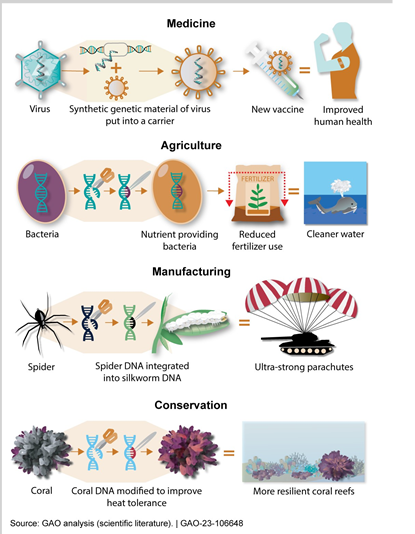Synthetic biology: What you need to know
Synthetic biology promises to be disruptive across multiple industries because it can be used to develop new biological parts and devices while reengineering existing systems.
DisrupTV caught up with three experts in the field on a recent episode. The roundtable captured some of the promise and peril with synthetic biology, a multidisciplinary field of science focused on reengineering organisms.
Here's a look at the key themes from the DisrupTV discussion and what you need to know.
What is synthetic biology? "Synthetic biology is the ability to design biological systems," said Dr. Megan Palmer, Senior Director for Public Impact at Ginkgo Bioworks and Adjunct Professor of Bioengineering at Stanford University. "We've been able to cut and paste DNA because we know the underlying code biology runs on for the last 50 years or so. Humans have been modifying biology for selective breeding of plants and animals for much longer than that."
"Now scientists and engineers are developing even better tools to be able to read, write, edit and evolve biological systems in ways that are easier, faster, more precise and predictable," said Palmer.
The upshot is that scientists and engineers are unlocking this ability to partner with biology in new ways.
The promise of synthetic biology. Palmer said she considers biology already the most powerful technology on the planet and the ability to program it means "we can use biology to manufacture nearly everything that is currently made with petrochemicals in ways that are more sustainable." Palmer said synthetic biology can impact multiple sectors in the economy such as health, food and manufacturing. There's even potential for data storage using DNA.
8 takeaways from Constellation Research's Healthcare Transformation Summit
Use cases for synthetic biology. Panelists noted a bevy of use cases ranging from space travel to food production to biomanufacturing and sustainability. Dr. Divya Chander, Anesthesiologist, Neuroscientist, and Data Scientist, said synthetic biology could play a role in space travel and "developing astronaut resilience." Chander said:
"We as humans aren't really very good at traveling in space because of microgravity in the radiation environment. There is a possibility of using gene editing tool, which are part of the synthetic biology toolkit, and turn genes on and off to give us more tolerance. Synthetic biology could also enable food production systems in space to improve nutrition and use fewer inputs like water or pesticides. We can even engineer our plants in space to do things like scrub toxins from the environment. CO2 is a big thing for astronauts, but also could do similar things on earth."
Chander said this gene editing could also be good for patients who are undergoing chemotherapy for cancer. With biomanufacturing, synthetic biology could print drugs that are more targeted.
Dr. David Bray, Distinguished Fellow at the Stimson Center and Business Executives for National Security, said sustainability will be a big use case for climate change. "I'm a big believer that the only way we're going to deal with climate change is with synthetic biology," said Bray, who noted that the technology could address the following:
- Clean water.
- Sustainable supply chains.
- Preventing pandemics before they start developing.
"We can organize ourselves in new ways so we can biologize industry instead of just industrializing biology," said Bray.
Chander said other use cases for synthetic biology include:
- Addressing chronic diseases such as cancer and extending longevity.
- Editing biologic machinery to address things like antibiotic resistance.
- Bio manufacturing targeted pharmaceuticals.
Growing the ecosystem and next generation. Palmer said iGEM, a non-profit focused on advancing synthetic biology, education and competition, has gone a long way to developing community in the industry. Palmer said iGEM competitions have encouraged students to design biological machines that are modular to solve problems. "Thousands of students across dozens of countries every year are developing biological innovations that are cool technologies, but also bake in social responsibility, safety and security into designs," said Palmer.
Risks with synthetic biology. Bray said it's promising that biology technologies are being democratized, but there will need to be some guardrails. "You know unleashed and craziness is going to happen, but we have multiple revolutions happening in parallel," said Bray, who added that the combination of AI and synthetic biology could be powerful for good uses and bad. "We are going to need the equivalent of smoke detectors for the biological space," he said. "Technologies like synthetic biology will be a tremendous force for good, but we also need to be ready for when some people try to use it for not so good purposes."
According to the US Government Accountability Office, synthetic biology presents safety and security concerns such as biological and chemical weapons and product tampering, environmental effects and public acceptance.
Ethics will be critical, said Palmer. Synthetic biology will require transparency and permission to use an individual's data. Society as a whole will have to think through ethics and biological data best practices, she said. Data trust will also be a key concept since individuals will be data producers. If you are going to read or write from someone's brain, you'll need full consent. The GAO noted that regulatory frameworks will be needed to address future applications of synthetic biology.
Multiple disciplines needed. The panelists said that synthetic biology will need multiple skills and sits at the intersection of data science, biology as well as ethics experts and technologists. Depending on the use case, industry expertise will also be needed.


